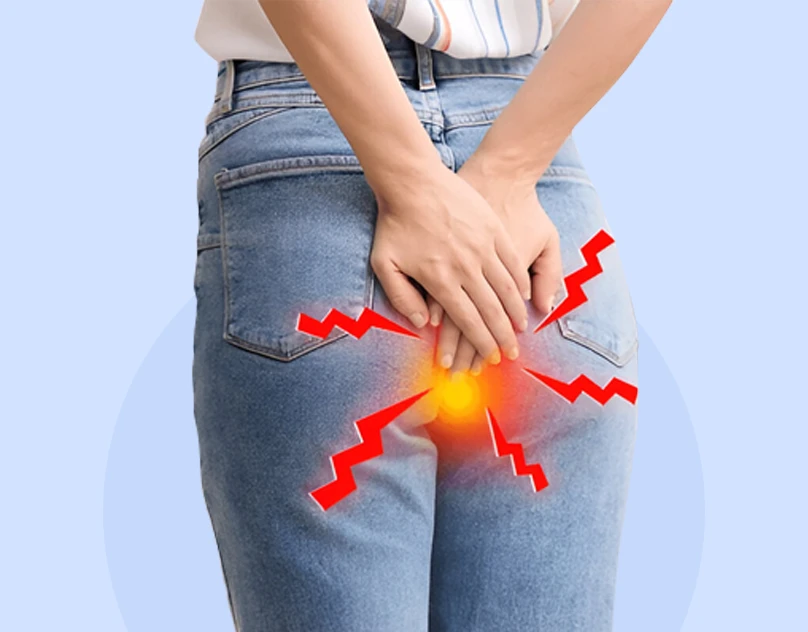

How to Prevent Piles, An Essential Strategies for Digestive Health
The medical term for Piles is haemorrhoids. They are usually a common and often uncomfortable issue that has affected millions worldwide. The condition is characterized by swollen and inflamed veins that are present in the rectum and anus. Piles like condition can range from mild irritation to some significant bleeding, pain, and itching like issues. Learning how to prevent piles can help in numerous ways.
While there are several prevalent issues, particularly in individuals who are over 50 (with approx. half of them might come across by this age). You need to understand how to prevent piles. It is well important for sustaining optimal digestive health and overall well-being.
In India, the prevalence is well estimated to be around 11%, influenced by factors including sedentary lifestyles, dietary habits, and genetic predisposition.
Here, you shall fine complete guide where you can delve into effective strategies for preventing piles. Here, you can be offered practical advice and some light on often-overlooked role of genetics that plays in condition such as piles.
What Exactly Are Piles?
Before discussing how to prevent piles, it is quite well helpful to understand what piles exactly mean.
The Hemorrhoids are essentially known to be the cushion to those blood vessels, connective tissue, and muscle which line the anal canal.
However, when some of these cushions might be quite well swollen and inflamed due to enhanced pressure, they can lead to some symptoms.
Piles can be classified differently with respect to below mentioned aspect:
- Internal Piles: They are well located inside the rectum. Typically, it is not visible or might felt so. They might all manifest through painless bleeding while pooping.
- External Piles: They are present under the skin right around that anus area. Such things can be quite well painful, itchy, and can form a blood clot (thrombosed known to be about those external haemorrhoid). This can eventually lead to a hard, tender lump.
Common Causes and Risk Factors
Issue such as piles is developed usually die to multifactorial, stemming from a combination of lifestyle alterations. While underlying health issues, and genetic predispositions. Some of the key contributing factors leading to piles are mentioned below:
- Chronic Constipation or diarrhoea: Act of straining while pooping due to constipation, or frequent loose stools, can notably put excessive pressure on the anal cushions. This act can lead to external as well as internal swelling.
- Low Fiber Diet: Insufficient use of fibre can eventually result in some hard, difficult-to-pass stools. This shall exacerbate constipation and several straining like condition.
- Prolonged Sitting: Spending extended periods sitting, especially while being on the toilet can enhance pressure on the rectal veins.
- Pregnancy and Childbirth: The enhanced pressure on the pelvic veins while pregnancy, with hormonal changes that weaken blood vessels. This complete act can significantly raise the risk of getting affected with piles.
- Obesity: Excess body weight can all lead to enhanced intra-abdominal pressure. This can further lead to condition like stress under the rectal veins.
- Heavy Lifting: Activities such as significant straining and holding breath can temporarily enhance pressure in the abdominal and other rectal areas.
- Aging: As we age, the tissues and muscles that might support the anal cushions can eventually weaken. It can be about incidences of piles that can peak right well between the age of 45 and 65.
- Family History: Holding a genetic predisposition can eventually make some individuals susceptible to developing piles often.
Comprehensive Strategies for How To Prevent Piles
Prevention is always better than cure. You need to especially be when it all comes to a condition which shall be uncomfortable as piles. Below mentioned are detailed strategies to minimize the risk:
Consider Following a High-Fiber Diet
Dietary fibre is believed to be great for those healthy bowel function. It can add bulk to stool. This shall further make it softer and easier to pass. This act shall lower the need for straining.
Enhanced Soluble and Insoluble Fiber: Consider use of 25 to 30 grams of fibre per day.
- Soluble fibre: Get it through use of barley, oats, nuts, seeds, lentils, beans, and some fruits including citrus and apples. They help to get dissolved in water.
- Insoluble fibre: Whole grains, vegetables, wheat bran, and fruit skins are sure to adds bulk to stool. This addition can help in moving through a smooth digestive system.
Stay Adequately Hydrated
Using good amount of water can work in conjunction with fibre. This can help the stool to soften down. Dehydration like condition can eventually lead to hard, dry stools. This further makes the bowel movements difficult.
- Consume Good Number of Fluids: You are to at least aim for using 8 to 10 glasses of water daily. Use of herbal teas and natural fruit juices contribute to fluid consumption.
- Limit Dehydrating Beverages: Lower intake of caffeine and alcohol. This can have some diuretic effects.
Establish Regular Bowel Habits
Paying attention to the body’s signals and about developing some of the consistent bowel habits can lower the strain.
- Avoid Delays in Bowel Movements: When you might feel complete urge to go, do not hold it back. Delaying to poop can lead to the stool becoming harder and more difficult to pass.
- Do Not Strain: Resisting the urge to push or strain can excessively while bowel movements. You need some gravity, and the natural process do that work.
- Limit Toilet Time: Do not sit on the toilet for a prolonged periods (make sure you are not there for more than 5 to 10 minutes). Do not reading or using any sort of electronic devices that can prolong your stay there.
Perform Regular Physical Activity
Performing exercises well can play a crucial role to answer how to prevent piles by:
- Promoting Healthy Bowel Function: Performing physical activity can stimulate bowel movements. This can notably lower the likelihood of constipation.
- Sustaining a Healthy Weight: Regular exercise helps in managing weight, lowering the pressure on rectal veins which is caused by obesity.
- Enhancing Circulation: Exercise enhances overall blood circulation. This act can further benefit the health of blood vessels. This includes those in the anal area.
- Various Exercise: Aim for approx. 30 minutes of moderate intensity exercise. It can include combination of walks, jogs, swimming, cycling, or power yoga.
Stick Around Healthy Weight
Obesity like issues can significantly enhance the risk of piles. It further lowers the pressure on the abdominal and pelvic area.
- Combination of some fibre-rich diet with physical activity helps in managing weight effectively. You need to consult a healthcare professional or a nutritionist with reference to personalized guidance whenever needed.
Follow Good Toilet Hygiene
Choosing some sort of hygiene in toilet can prevent irritation and inflammation right around the anus.
- Gentle Cleaning: After pooping, make sure you clean the anal area gently with soft, moist toilet paper or a bidet. Do not harsh scrubbing or use any abrasive materials.
- Sitz Baths: If at all you have any existing irritation, choose warm sitz baths and it can provide relief and helps in promoting healing.
Avoid Heavy Lifting (or Lift Correctly)
When the daily activities or profession are involved in heavy lifting, it is about crucial to adopt proper lifting techniques. This condition helps in minimizing abdominal straining.
- Lift Legs: Bend your knees and keep back quite well straight. Make use of the leg muscles to lift. You need to rather than straining the back and abdomen too.
- Exhale On Lifting: Do not hold the breath, as this shall enhance internal pressure. Simply exhale as you shall lift.
The Role of Genetic Testing To Learn About Piles
While some of the lifestyle modifications are critical on preventing piles, it is also important for acknowledging that some individuals might have a genetic predisposition. This shall enhance the susceptibility as per the condition. Some of the recent advancements in genetic research have all shed light on the hereditary component of hemorrhoids.
Genetic Predisposition and Haemorrhoids:
There is various research that has suggested about genetics, and it can influence the strength and integrity of connective tissues. This is with respect to the vascular system in the anal canal. Individuals might further inherit genes that can lead to:
- Weaker Connective Tissues
- Vascular Abnormalities
- Predisposition to Related Conditions
Well significant 2021 study that was published in the BMJ journal Gut identified 102 regions in the human genome. It contains that genes are well linked to an enhanced risk of developing hemorrhoids like condition. Some of these genes are well involved in smooth muscle function and the development and integrity of epithelial and endothelial structures. This is with reference to the gut, suggesting smooth muscle dysfunction that might be contributing genetic factor.
Genes including NOX1 and NOS3 have been highlighted as some of the particularly significant in hemorrhoid risk. This is with respect to the NOS3 which is a potential druggable target for some sort of therapeutic intervention.
How Genetic Testing Helps:
Genetic testing like help in particularly helps in advancing gastrointestinal genetic testing. This can all provide some valuable insights into an individual’s inherited risk factors for conditions including haemorrhoids. Further, on analysing some of the specific genetic markers, it can:
- Help in identifying some of the genetic susceptibility
- Leads personalize prevention strategies
- Inform early intervention
- Distinguish from other similar conditions
- Helps and contributes to condition of research
It is also important to remember that a genetic predisposition might not guarantee the development of piles. Instead, it shall indicate an enahnced likelihood. Lifestyle choices shall all continue to play a paramount role in sustaining and mitigating this genetic risk. Genetic testing like help can serve as a powerful tool. This can offer a personalized approach to proactive health management.
When to Seek Medical Attention
While you know prevention is the key, it is equally important for knowing when to consult a healthcare professional.
- Rectal bleeding: While some of the things that are well associated with piles, rectal bleeding can also be a major symptom. With respect to some severe conditions including colorectal cancer. It is well crucial to get it checked by a doctor.
- Persistent pain or discomfort: When some home remedies do not provide relief, or if the pain is just so severe to bare.
- Prolapsed haemorrhoids that do not retract: If internal hemorrhoids protrude and remain on the outside of the anus.
- Any unexpected alterations in the bowel habits
LifeCode’s Advanced Gastrointestinal Genetic Testing
Piles are known to be a common ailment. However, the issue is quite well preventable. On further adopting a proactive approach which shall include a high-fiber diet, adequate hydration, regular exercise, healthy bowel habits, and sustaining a healthy weight, you can lower the risk.
Understanding some of the underlying causes, shall include genetic predispositions, empowers one to make targeted preventative measures.
Understanding genetic predispositions can be a powerful step while preventing conditions related to piles. If you are looking for a deeper insight into your gastrointestinal health and potential inherited risks. You need to consider LifeCode’s Advanced Gastrointestinal Genetic Testing.
LifeCode is a great platform to offer comprehensive genetic analysis that helps to uncover unique genetic makeup. This helps in related to some sort of digestive health. By identifying specific genetic which shall be about markers that are well associated with conditions including hemorrhoids. You can further gain well valuable knowledge to personalize prevention strategies and make good decisions about well-being.
Visit LifeCode to learn more about our Advanced Gastrointestinal Genetic Testing and how it can help you take control of your gut health.

Can You Inherit Migraine Risk The Truth About Women’s Brain Health
Can You Inherit Migraine Risk The Truth About Women’s Brain Health The Genetic Link to Migraines, It Is More Than Just Bad Luck Why Women are More...


Unlocking Your Body’s Blueprint: Genetic Clues to Pregnancy Complications and Hypertension
Unlocking Your Body's Blueprint: Genetic Clues to Pregnancy Complications and Hypertension The Intricate Dance of Genes and Health Decoding Pregnancy Complications Through Genetics The Genetic Roots of...

Education: Bachelor of Pharmacy (B.Pharm) from the Tata Institute of Social Sciences (TISS), Mumbai Experience: Agarwal is a seasoned pharmacist with over 7 years of experience in the pharmaceutical field. She has worked in various settings, including hospital pharmacies and community clinics, where she has excelled in medication management, patient counseling, and clinical support. Agarwal is known for her expertise in drug therapy optimization and patient safety. In addition to her practical experience, she contributes to health journalism, focusing on pharmaceutical advancements and health policy, and is involved in research projects aimed at improving medication practices and health outcomes. is known for her expertise in drug therapy optimization and patient safety. In addition to her practical experience, she contributes to health journalism, focusing on pharmaceutical advancements and health policy, and is involved in research projects aimed at improving medication practices and health outcomes.


